-
 Bitcoin
Bitcoin $104,248.9280
1.33% -
 Ethereum
Ethereum $2,694.6911
8.12% -
 XRP
XRP $2.5765
1.17% -
 Tether USDt
Tether USDt $1.0001
0.01% -
 Solana
Solana $183.0201
5.19% -
 BNB
BNB $665.6122
0.40% -
 USDC
USDC $1.0000
0.00% -
 Dogecoin
Dogecoin $0.2398
3.63% -
 Cardano
Cardano $0.8323
1.14% -
 TRON
TRON $0.2713
-0.06% -
 Sui
Sui $4.0710
2.26% -
 Chainlink
Chainlink $17.5757
4.81% -
 Avalanche
Avalanche $25.8817
3.65% -
 Stellar
Stellar $0.3152
0.04% -
 Shiba Inu
Shiba Inu $0.0...01636
3.59% -
 Hedera
Hedera $0.2170
0.12% -
 Pi
Pi $1.2460
-1.55% -
 Hyperliquid
Hyperliquid $26.0435
5.15% -
 Toncoin
Toncoin $3.4164
1.81% -
 Polkadot
Polkadot $5.2072
2.13% -
 Bitcoin Cash
Bitcoin Cash $412.4948
0.62% -
 UNUS SED LEO
UNUS SED LEO $8.6932
1.42% -
 Litecoin
Litecoin $103.9881
1.25% -
 Monero
Monero $340.8560
1.21% -
 Pepe
Pepe $0.0...01457
6.71% -
 Bitget Token
Bitget Token $4.8502
1.98% -
 Dai
Dai $1.0000
0.00% -
 Ethena USDe
Ethena USDe $1.0007
-0.01% -
 Uniswap
Uniswap $7.1519
3.69% -
 Bittensor
Bittensor $465.2946
0.86%
What is the relationship between Bitcoin wallet addresses and cold wallets?
Cold wallets use Bitcoin addresses, acting as public identifiers for receiving and sending Bitcoin, while securely storing private keys offline to protect cryptocurrency holdings.
Mar 02, 2025 at 05:06 pm
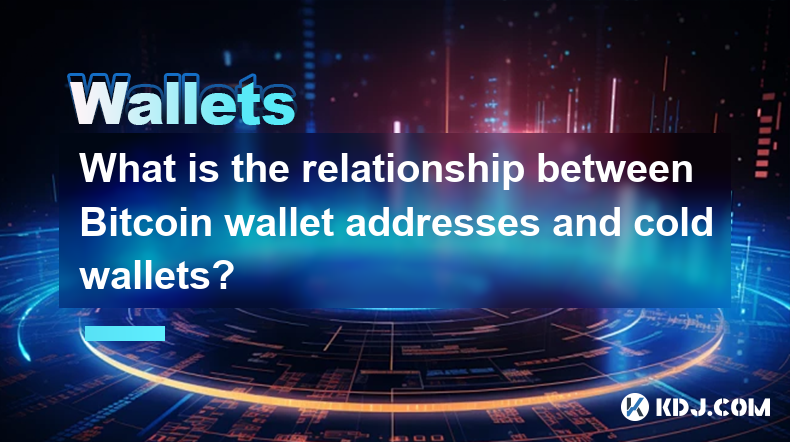
What is the Relationship Between Bitcoin Wallet Addresses and Cold Wallets?
Key Points:
- Bitcoin wallet addresses are simply identifiers used to receive and send Bitcoin. They are not the wallet itself.
- Cold wallets are offline storage devices for cryptocurrencies, prioritizing security over accessibility. They use wallet addresses to interact with the Bitcoin network.
- The relationship is that a cold wallet uses one or more Bitcoin wallet addresses to manage and interact with Bitcoin on the blockchain. The addresses are essentially the "public-facing" aspect of the cold wallet, while the private keys (which control access to the Bitcoin) remain securely offline within the cold wallet device.
- Understanding this distinction is crucial for securing your Bitcoin holdings.
Understanding Bitcoin Wallet Addresses:
- What is a Bitcoin Wallet Address? A Bitcoin wallet address is a unique alphanumeric string, similar to a bank account number. It's a publicly accessible identifier used to receive Bitcoin. When someone sends you Bitcoin, they use your wallet address to direct the transaction to the correct location on the blockchain. Think of it as your Bitcoin mailbox – everyone can see the mailbox, but only you have the key (private key) to access the contents. This address is derived from your public key, which in turn is derived from your private key using cryptographic functions. The process is one-way, meaning it’s computationally infeasible to derive the private key from the public key.
- Public vs. Private Keys: This is fundamental to understanding Bitcoin security. The public key is like your address; it’s shared openly. The private key is like your password; it must be kept absolutely secret. The private key allows you to sign transactions, proving you own the Bitcoin associated with the corresponding public key and address. Losing your private key means losing access to your Bitcoin permanently. There's no way to recover it. Therefore, safeguarding your private keys is paramount.
- Multiple Addresses per Wallet: A single Bitcoin wallet can generate multiple addresses. This is a best practice for security and privacy. Using a new address for each transaction enhances anonymity by making it more difficult to link transactions to a single identity. This prevents attackers from tracking your spending habits. Furthermore, using multiple addresses helps to compartmentalize funds, offering an additional layer of security should one address be compromised.
- Address Formats: Bitcoin addresses can come in various formats (e.g., P2PKH, P2SH, Bech32). These different formats reflect different underlying cryptographic schemes used to secure the transactions. While the format may vary, the core functionality remains the same: to identify a specific location on the blockchain where Bitcoin can be sent and received. Modern wallets generally handle these format differences automatically, so the user doesn't need to worry about the technical details. However, understanding these differences can be helpful in troubleshooting or analyzing blockchain data.
The Role of Cold Wallets:
- What is a Cold Wallet? A cold wallet, also known as an offline wallet, is a storage device designed to keep your Bitcoin offline and thus protected from hacking attempts. Unlike hot wallets (connected to the internet), cold wallets significantly reduce the risk of theft through malware or phishing attacks. The fundamental principle is to keep your private keys entirely separate from any device connected to the internet. This separation is crucial for maintaining the security of your Bitcoin.
- Types of Cold Wallets: There are various types of cold wallets, each with its own security features and levels of user-friendliness. These include hardware wallets (physical devices like Ledger and Trezor), paper wallets (printed private keys and addresses), and even air-gapped computers specifically dedicated to managing Bitcoin. Each option presents a different trade-off between security, convenience, and cost.
- Cold Wallet Security Mechanisms: Cold wallets employ several security measures to protect your private keys. These often include secure chipsets, tamper-evident packaging, and robust encryption algorithms. The most secure cold wallets are those with a combination of these features and a user-friendly interface that minimizes the risk of human error. It’s crucial to choose a reputable cold wallet provider with a proven track record of security and a strong community following.
- Using a Cold Wallet with Bitcoin Addresses: When you use a cold wallet, you generate Bitcoin addresses on the device itself. These addresses are then used to receive Bitcoin. When you wish to send Bitcoin, you initiate the transaction on the cold wallet, sign it using your private keys (which remain offline), and then transmit the signed transaction to the Bitcoin network through a computer connected to the internet. This process minimizes the exposure of your private keys to online threats.
The Interplay Between Cold Wallets and Bitcoin Addresses:
- Addresses as the Interface: The Bitcoin addresses generated by your cold wallet serve as the interface between your offline storage and the Bitcoin network. They are the identifiers that allow others to send you Bitcoin and you to receive it.
- Private Keys Remain Offline: The crucial aspect is that the private keys associated with these addresses remain securely stored within the cold wallet, never directly exposed to the internet. This separation is the core security feature of a cold wallet.
- Transaction Signing: When you initiate a transaction, the cold wallet uses your private keys to sign the transaction, proving ownership and authorizing the transfer of Bitcoin. This signed transaction is then broadcast to the network.
- Security Through Separation: The separation of private keys from the internet, facilitated by the use of addresses, is what makes cold wallets significantly more secure than hot wallets. This separation drastically reduces the risk of theft from online attacks.
FAQs:
Q: Can I use the same Bitcoin address multiple times?
A: Yes, you can reuse a Bitcoin address. However, it's generally recommended to use a new address for each transaction to enhance privacy and security. Reusing addresses can make it easier for others to track your transactions and potentially link them to your identity.
Q: What happens if I lose my cold wallet?
A: Losing your cold wallet means losing access to the Bitcoin associated with the private keys stored within it. There is no recovery mechanism. Therefore, it's crucial to store your cold wallet securely and to back up your recovery seed phrase (a list of words used to recover your wallet) in a safe and separate location. Never store your recovery seed phrase digitally.
Q: Are cold wallets completely secure?
A: While cold wallets offer significantly enhanced security compared to hot wallets, they are not completely invulnerable. Physical theft, loss, or damage to the cold wallet device could compromise your Bitcoin. Furthermore, vulnerabilities in the cold wallet's firmware could theoretically be exploited. Choosing a reputable brand with a strong security track record is essential.
Q: How do I choose a good cold wallet?
A: Consider factors like reputation, security features (e.g., secure element chip), user reviews, and ease of use. Research different brands like Ledger and Trezor and compare their features before making a decision. Ensure the wallet you choose is actively supported and receives regular security updates.
Q: What is a seed phrase and why is it important?
A: The seed phrase is a sequence of words that acts as a master key to your cold wallet. It's crucial for recovering your wallet if the device is lost or damaged. It should be kept securely offline and never shared with anyone. This phrase is cryptographically used to regenerate all your private keys and wallet addresses. Losing your seed phrase means irreversible loss of access to your funds.
Q: Can I use a cold wallet with multiple cryptocurrencies?
A: Some cold wallets support multiple cryptocurrencies, while others are specifically designed for a single cryptocurrency like Bitcoin. Check the wallet's specifications before purchasing to ensure it's compatible with the cryptocurrencies you intend to store. Always ensure the wallet is updated to the latest version for optimal security.
Q: What are the differences between hardware wallets and paper wallets?
A: Hardware wallets are physical devices offering a higher degree of security due to their secure elements and offline nature. Paper wallets are printed keys and addresses, offering a simple but less convenient and potentially less secure solution due to the risk of physical damage or loss. Hardware wallets provide a user interface and better protection against physical tampering. Paper wallets require careful handling and storage.
Q: Is it possible to recover Bitcoin from a lost cold wallet without the seed phrase?
A: No. Without the seed phrase, there's no way to recover the private keys associated with your Bitcoin addresses, making it impossible to regain access to your funds. This underscores the importance of securely storing your seed phrase. Remember that the seed phrase is the only way to restore your wallet, regardless of the hardware or software used. Always prioritize the security of this crucial recovery mechanism.
Disclaimer:info@kdj.com
The information provided is not trading advice. kdj.com does not assume any responsibility for any investments made based on the information provided in this article. Cryptocurrencies are highly volatile and it is highly recommended that you invest with caution after thorough research!
If you believe that the content used on this website infringes your copyright, please contact us immediately (info@kdj.com) and we will delete it promptly.
- Ethereum (ETH) Price Rallies Over 8% to Reach a Daily High of About $2702
- 2025-05-14 07:05:13
- Unstaked (ADA) Price Analysis and SHIB Dip Flash Red, Unstaked's AI Presale Races Past $5M
- 2025-05-14 07:05:13
- Solana's $10.9 Billion TVL Surpasses the Entire Ethereum Layer-2 Ecosystem
- 2025-05-14 07:00:12
- When Crypto Projects Combine Useful Features or Strong Stories, They Often Get Noticed
- 2025-05-14 07:00:12
- How to purchase Bitcoin safely
- 2025-05-14 06:55:13
- Will Nvidia Add Bitcoin to Its Treasury Following Recent Speculation?
- 2025-05-14 06:55:13
Related knowledge
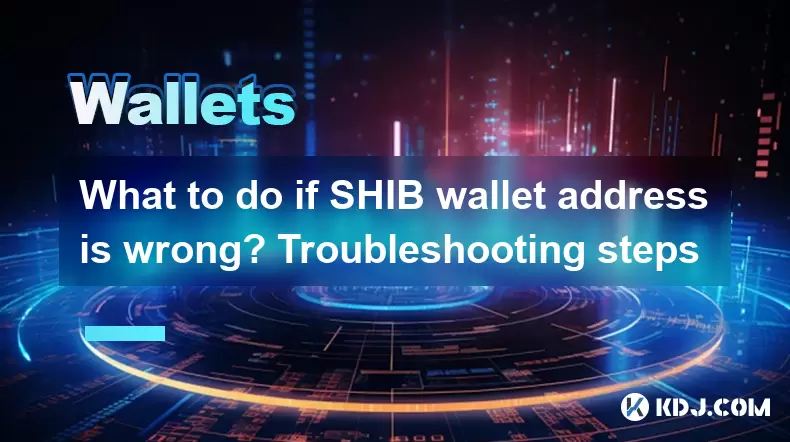
What to do if SHIB wallet address is wrong? Troubleshooting steps
May 14,2025 at 04:28am
If you've entered the wrong SHIB wallet address, it can be a stressful situation, especially if you've already sent your SHIB tokens. However, there are several steps you can take to troubleshoot and potentially resolve the issue. Let's walk through the process step-by-step. Verify the Transaction DetailsThe first thing you should do is verify the trans...
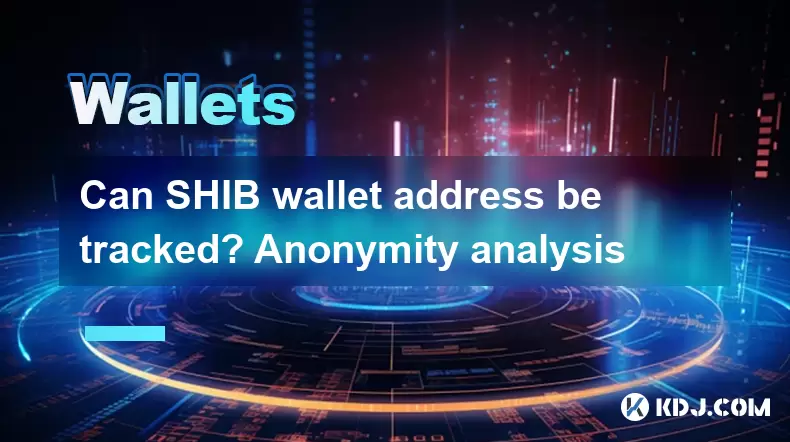
Can SHIB wallet address be tracked? Anonymity analysis
May 14,2025 at 06:50am
The question of whether a SHIB wallet address can be tracked and the level of anonymity it provides is a crucial concern for many users in the cryptocurrency space. SHIB, or Shiba Inu, is a popular meme token that operates on the Ethereum blockchain. Understanding the traceability of SHIB wallet addresses involves delving into the nature of blockchain t...
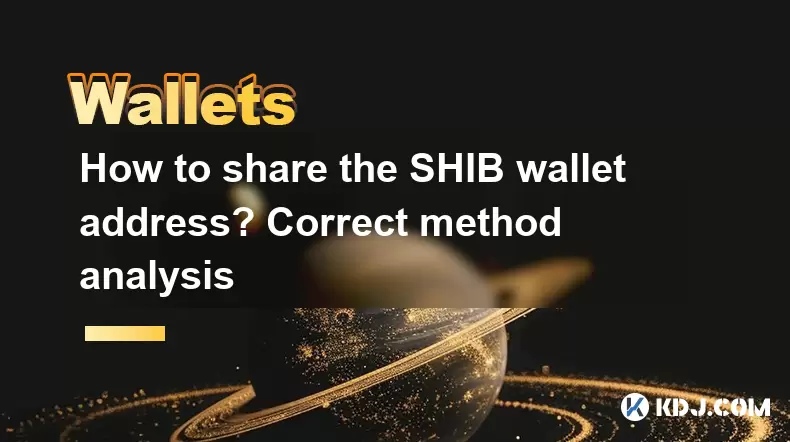
How to share the SHIB wallet address? Correct method analysis
May 14,2025 at 02:50am
Sharing your SHIB wallet address is a common task for those involved in the cryptocurrency world, particularly if you're dealing with Shiba Inu (SHIB) tokens. However, it's crucial to understand the correct methods to share your wallet address to ensure the safety and security of your funds. This article will guide you through the process and highlight ...
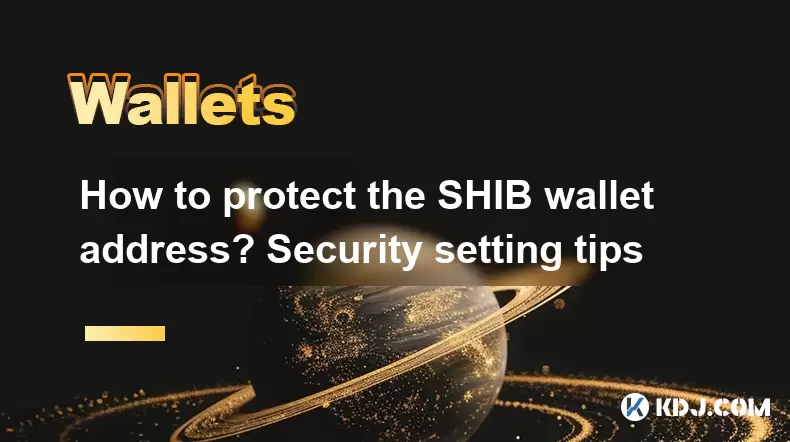
How to protect the SHIB wallet address? Security setting tips
May 13,2025 at 04:07pm
Protecting your SHIB wallet address is crucial to safeguarding your cryptocurrency assets. With the rise of digital currencies, securing your wallet has become more important than ever. This article will provide you with detailed security setting tips to ensure your SHIB wallet remains safe from potential threats. Understanding SHIB Wallet SecurityBefor...
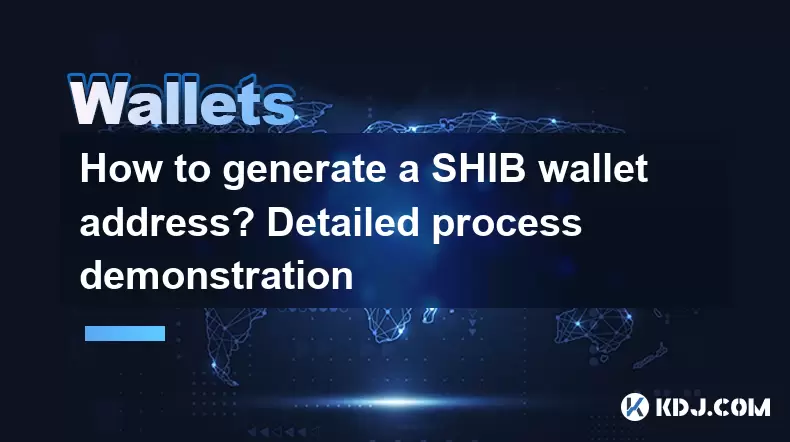
How to generate a SHIB wallet address? Detailed process demonstration
May 13,2025 at 08:43pm
Creating a SHIB (Shiba Inu) wallet address is a straightforward process that allows you to securely store, send, and receive SHIB tokens. This article will guide you through the detailed steps to generate a SHIB wallet address using popular methods such as MetaMask and Trust Wallet. Let's dive into the process. Choosing a Wallet PlatformBefore you can g...
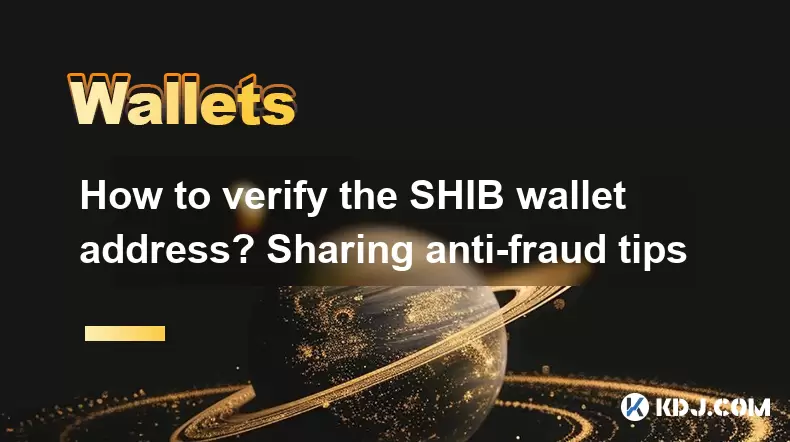
How to verify the SHIB wallet address? Sharing anti-fraud tips
May 13,2025 at 08:56pm
Verifying a SHIB (Shiba Inu) wallet address and protecting yourself from fraud are crucial steps in managing your cryptocurrency safely. This article will guide you through the process of verifying your SHIB wallet address and share essential anti-fraud tips to ensure your digital assets remain secure. Understanding SHIB Wallet AddressesBefore diving in...

What to do if SHIB wallet address is wrong? Troubleshooting steps
May 14,2025 at 04:28am
If you've entered the wrong SHIB wallet address, it can be a stressful situation, especially if you've already sent your SHIB tokens. However, there are several steps you can take to troubleshoot and potentially resolve the issue. Let's walk through the process step-by-step. Verify the Transaction DetailsThe first thing you should do is verify the trans...

Can SHIB wallet address be tracked? Anonymity analysis
May 14,2025 at 06:50am
The question of whether a SHIB wallet address can be tracked and the level of anonymity it provides is a crucial concern for many users in the cryptocurrency space. SHIB, or Shiba Inu, is a popular meme token that operates on the Ethereum blockchain. Understanding the traceability of SHIB wallet addresses involves delving into the nature of blockchain t...

How to share the SHIB wallet address? Correct method analysis
May 14,2025 at 02:50am
Sharing your SHIB wallet address is a common task for those involved in the cryptocurrency world, particularly if you're dealing with Shiba Inu (SHIB) tokens. However, it's crucial to understand the correct methods to share your wallet address to ensure the safety and security of your funds. This article will guide you through the process and highlight ...

How to protect the SHIB wallet address? Security setting tips
May 13,2025 at 04:07pm
Protecting your SHIB wallet address is crucial to safeguarding your cryptocurrency assets. With the rise of digital currencies, securing your wallet has become more important than ever. This article will provide you with detailed security setting tips to ensure your SHIB wallet remains safe from potential threats. Understanding SHIB Wallet SecurityBefor...

How to generate a SHIB wallet address? Detailed process demonstration
May 13,2025 at 08:43pm
Creating a SHIB (Shiba Inu) wallet address is a straightforward process that allows you to securely store, send, and receive SHIB tokens. This article will guide you through the detailed steps to generate a SHIB wallet address using popular methods such as MetaMask and Trust Wallet. Let's dive into the process. Choosing a Wallet PlatformBefore you can g...

How to verify the SHIB wallet address? Sharing anti-fraud tips
May 13,2025 at 08:56pm
Verifying a SHIB (Shiba Inu) wallet address and protecting yourself from fraud are crucial steps in managing your cryptocurrency safely. This article will guide you through the process of verifying your SHIB wallet address and share essential anti-fraud tips to ensure your digital assets remain secure. Understanding SHIB Wallet AddressesBefore diving in...
See all articles






















































































